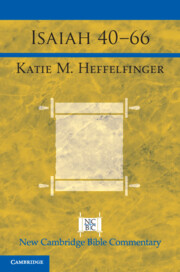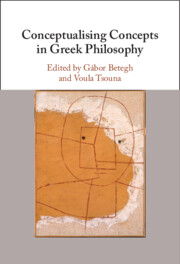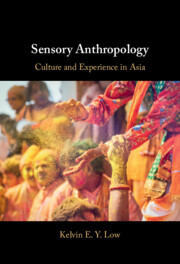163 results
3 - The History of Sexuality and Women’s History
-
-
- Book:
- The Cambridge World History of Sexualities
- Published online:
- 26 April 2024
- Print publication:
- 16 May 2024, pp 45-67
-
- Chapter
- Export citation

Isaiah 40–66
-
- Published online:
- 04 May 2024
- Print publication:
- 09 May 2024
Chapter 15 - Contested Concepts
-
-
- Book:
- Conceptualising Concepts in Greek Philosophy
- Published online:
- 25 April 2024
- Print publication:
- 02 May 2024, pp 345-367
-
- Chapter
- Export citation
Chapter 8 - Aristotle on the Stages of Cognitive Development
-
-
- Book:
- Conceptualising Concepts in Greek Philosophy
- Published online:
- 25 April 2024
- Print publication:
- 02 May 2024, pp 178-202
-
- Chapter
- Export citation

Conceptualising Concepts in Greek Philosophy
-
- Published online:
- 25 April 2024
- Print publication:
- 02 May 2024
Chapter 11 - “Obviously Wrong”: The Tractatus on Will and World
-
-
- Book:
- Wittgenstein's <I>Tractatus Logico-Philosophicus</I>
- Published online:
- 07 March 2024
- Print publication:
- 14 March 2024, pp 203-218
-
- Chapter
- Export citation
Barriers and facilitators to consuming pulses: a qualitative exploration including effects of trying recipes at home
-
- Journal:
- Journal of Nutritional Science / Volume 13 / 2024
- Published online by Cambridge University Press:
- 31 January 2024, e6
-
- Article
-
- You have access
- Open access
- HTML
- Export citation
7 - Cognitive Linguistics and Context
- from Part II - Philosophical, Semantic, and Grammatical Approaches to Context
-
-
- Book:
- The Cambridge Handbook of Language in Context
- Published online:
- 30 November 2023
- Print publication:
- 14 December 2023, pp 160-180
-
- Chapter
- Export citation
Chapter 6 - Two Ways of Being Wise
- from Part III - Johnson, Dramatic Poetry and Thinking
-
- Book:
- The Literary Criticism of Samuel Johnson
- Published online:
- 07 September 2023
- Print publication:
- 21 September 2023, pp 111-126
-
- Chapter
- Export citation
2 - Norms and Practice
- from Part I
-
- Book:
- On Global Learning
- Published online:
- 07 September 2023
- Print publication:
- 21 September 2023, pp 39-73
-
- Chapter
- Export citation
12 - The Temporality of Entrepreneurship
- from Part III - New Ways of Organizing Work, Digitality and the Politics of Time
-
-
- Book:
- Organization as Time
- Published online:
- 22 June 2023
- Print publication:
- 06 July 2023, pp 256-274
-
- Chapter
- Export citation
Experience of financial challenges, retirement concerns, and planning: evidence from representative samples of workers in 16 countries
-
- Journal:
- Journal of Pension Economics & Finance / Volume 23 / Issue 2 / April 2024
- Published online by Cambridge University Press:
- 19 June 2023, pp. 183-201
-
- Article
-
- You have access
- Open access
- HTML
- Export citation
4 - A Way Ahead
- from Part I - Taking Stock of Evidence-Based Policing
-
-
- Book:
- The Future of Evidence-Based Policing
- Published online:
- 01 June 2023
- Print publication:
- 15 June 2023, pp 64-82
-
- Chapter
- Export citation
4 - An Open and Determined Mindset
- from Part I - Caring For Your Mind
-
-
- Book:
- The Gift of Aging
- Published online:
- 08 June 2023
- Print publication:
- 08 June 2023, pp 22-28
-
- Chapter
- Export citation
Chapter 4 - Minds
-
- Book:
- Ancient Greek Texts and Modern Narrative Theory
- Published online:
- 11 May 2023
- Print publication:
- 25 May 2023, pp 81-114
-
- Chapter
- Export citation
District nurses’ experiences of giving initial health care assessment to young adults applying for mental illness in primary care: a qualitative interview study
-
- Journal:
- Primary Health Care Research & Development / Volume 24 / 2023
- Published online by Cambridge University Press:
- 17 April 2023, e27
-
- Article
-
- You have access
- Open access
- HTML
- Export citation
Does Delegation of Drafting Duties to Law Clerks Result in Judgments That Show Lack of Confidence in Terms of Writing Style? A Stylometric Analysis
-
- Journal:
- Journal of Law and Courts / Volume 12 / Issue 1 / April 2024
- Published online by Cambridge University Press:
- 03 April 2023, pp. 110-131
-
- Article
-
- You have access
- Open access
- HTML
- Export citation

Sensory Anthropology
- Culture and Experience in Asia
-
- Published online:
- 02 March 2023
- Print publication:
- 09 March 2023
Chapter 7 - Experimental Philosophy in Eighteenth-Century Germany
- from Part III - From Experimental Philosophy to Empiricism
-
- Book:
- Experimental Philosophy and the Origins of Empiricism
- Published online:
- 17 February 2023
- Print publication:
- 23 February 2023, pp 203-233
-
- Chapter
- Export citation
3 - Development Issues around Sex
-
- Book:
- Impulse
- Published online:
- 09 February 2023
- Print publication:
- 09 February 2023, pp 30-50
-
- Chapter
- Export citation



